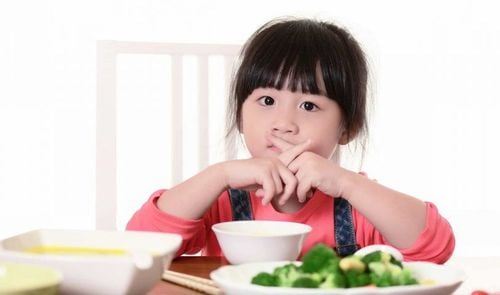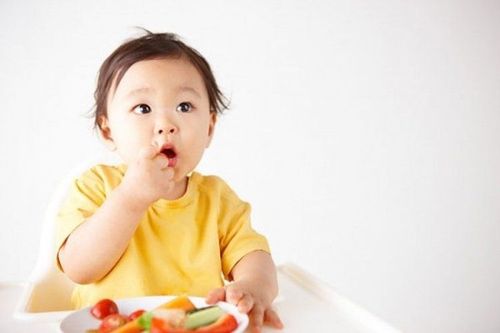This is an automatically translated article.
Children with anorexia are a common problem and also a concern of many parents. When sick, most children lose their appetite and become anorexic, contributing to a vicious cycle of illness and malnutrition that can be dangerous to children, especially those under the age of 2.
1. Why are children malnourished after illness?
Experts find that, during illness, children may have loss of appetite, difficulty swallowing, difficulty feeding due to cough or nasal congestion. In addition, children also experience malabsorption of nutrients, loss of stored energy, dehydration due to vomiting or diarrhea. As a result, children's development often slows down, even children become malnourished after being ill, even though they are ill for a short period of time.
Repeated episodes of common illness such as diarrhea, gastrointestinal disorders, respiratory infections, malaria or measles deplete the overall nutritional status of infants and young children, thereby degrading them. reduce the child's immunity.
Deficiencies in important micronutrients such as vitamin A and zinc weaken the body's defenses against infection. According to statistics, on average, in a year, children under the age of 5 can have diarrhea five times and acute respiratory infections (ARI) more than six times. 80% of nutrition-related deaths occur in children with low or moderate birth weight.
In summary, the risk of children suffering from malnutrition after illness is quite high, especially for children under 2 years old. It is very important to feed your child the right food both during and after illness.

Trẻ bị suy dinh dưỡng sau ốm xảy ra khá thường xuyên, nhất là ở các bé dưới 2 tuổi
2. Principles of taking care of sick and anorexic children
In order to ensure adequate nutrition for newly ill children, it is necessary to follow some basic principles:
Encourage children to drink and eat more food from when they are sick until after they are sick to help them recover. Parents or caregivers should keep a patient attitude, encourage children to eat and drink, and do not put pressure on children. It is advisable to feed an anorexic child many small meals a day Prioritize the foods the child likes Feed a variety of foods rich in nutrients Continue to breastfeed, especially for young children get sick often. Feed your baby more often Feed during recovery
3. Diet for some diseases
3.1 Diarrhea Children are at high risk for diarrhea between the ages of about 6 and 11 months. This is the period when babies start eating solid foods and are introduced to many different foods. Growth curves often plummet during this period.
Breastfeeding counseling is important for young children with diarrhea. Babies under 6 months of age with diarrhea are unlikely to be exclusively breastfed. For most children, continuing to breastfeed during acute diarrhea can significantly shorten the duration of the illness and speed recovery.
The majority of diarrhea-related deaths are due to dehydration. However, even a child who is not dehydrated should be given extra fluids and continued feedings to speed recovery. Babies who show signs of moderate dehydration should first be rehydrated, even if they are still nursing normally.
Infants under 6 months of age with diarrhea without dehydration:
If the baby is exclusively breastfed - feed more often and longer at each feed. Provide extra clean water or a solution containing water and electrolytes (oresol) to prevent dehydration. If not breastfed - give your baby milk as usual. Provide extra clean water or oresol similar to breastfed babies. Children over 6 months of age with diarrhea without dehydration
Feed your baby more often and longer at each feeding. Give more fluids than usual to prevent dehydration. Dangerous liquids to avoid during diarrhea include chemically-sweetened bottled drinks, canned fruit juices, and sweetened teas. Stimulant, diuretic liquids such as coffee or certain medicinal teas should also be avoided. Continue to feed your baby normally and there is no need to dilute the food. Continue feeding your child to promote the rate at which intestinal function is restored and the ability to digest and absorb nutrients. Diarrhea and moderate dehydration
Children who show signs of dehydration when they have diarrhea need to be rehydrated. It is best to use oresol packaged according to weight and age, using a clean spoon or cup. Also:
For infants under 6 months of age, continue breastfeeding during rehydration whenever the baby wants. For children under 6 months of age who are not breastfed, give 100-200 ml of clean water during rehydration; then continue with formula. For older babies, continue to breastfeed whenever they want. Start feeding after about four hours of rehydration.

Cha mẹ cần đảm bảo chế độ dinh dưỡng phù hợp cho trẻ ốm dậy biếng ăn
Severe dehydration
A child with severe dehydration needs intravenous treatment and hospitalization.
Rehydration is indispensable. The gold standard for rehydration is packaged oresol. It can take four hours or more to rehydrate a child, giving the child ORS with a cup or spoon. Rehydration with food-based fluids such as “usually salty” rice porridge is just as effective as providing standard ORS.
Using anti-diarrheal drugs can be harmful without a doctor's prescription. WHO currently recommends a low osmolarity oresol product to be used in children for the relief of diarrhea symptoms and duration of illness.
Children with diarrhea should be returned to a normal diet as soon as possible. Food should be cooked thoroughly and mashed or ground for easy digestion, but not diluted. Continue adding fats and oils for energy.
Should give meat, fish or eggs if available. Foods rich in potassium, such as bananas, are very beneficial for children who are just getting sick with anorexia. A diet high in bananas and pectin also significantly reduced stool and vomiting.
3.2 Acute respiratory tract infection (pneumonia) Even a mild acute respiratory infection can cause a stuffy nose or cough, leading to difficulty feeding. Children of all ages can choke on food when they cough. If a breastfed baby cannot feed normally, milk should be expressed using a cup and spoon. Have the child sit up; feed slowly.
You may need more time, patience and confidence than usual when breastfeeding.
3.3 Measles Children with measles can still have severe diarrhea as well as respiratory problems with a high fever. Children may have sores inside their mouth.
Children with measles need to be well hydrated. Food processing should pay attention to foods that are soft, mashed, not spicy and less spicy
In the case of malnourished children, anorexia after illness, parents should supplement children with supporting products containing lysine, Essential micro-minerals and vitamins such as zinc, chromium, selenium, and B vitamins help to fully meet the nutritional needs of children. At the same time, these essential vitamins also support digestion, enhance nutrient absorption, help improve anorexia, and help children eat well. Parents can simultaneously apply dietary supplements and functional foods derived from nature for easy absorption. The most important thing is that improving your baby's symptoms often takes a long time. Combining many types of functional foods at the same time or changing many types in a short time can make the baby's digestive system unable to adapt and completely not good. Therefore, parents must be really patient with their children and regularly visit the website vimec.com to update useful baby care information.













